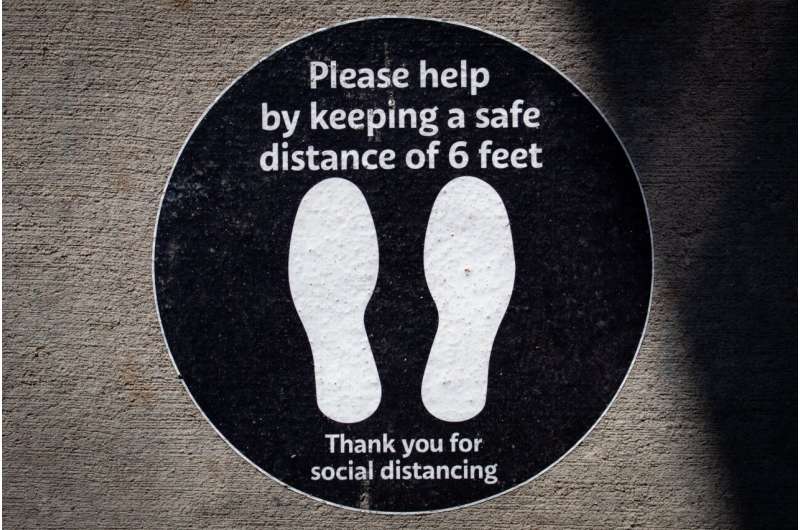Perceptions shaped social behavior during the pandemic

The pandemic evoked fear of all kinds, much of it centered on how COVID-19 endangers people's physical health. But Penn psychologist Adrianna (Anna) Jenkins and MindCORE postdoctoral fellow Rista Plate wanted to understand how pandemic-related worry about people's social lives was affecting their behavior, too.
Across three studies with more than 650 participants, the researchers found that some Americans felt greater concern over losing social connections than health outcomes, and those people were the ones who continued interacting with others, contrary to social guidelines. In other words, rather than taking actions to potentially shorten the pandemic, they instead behaved in ways that risked prolonging it and the associated disease-mitigating social restrictions.
"Paradoxically," says Jenkins, an assistant professor in the Department of Psychology, "their fear may have led them to engage in behaviors that would bring about the outcomes they most dreaded."
What's more, perceptions of the pandemic's social impact weren't static, increasing as the pandemic continued, says Plate. "Presumably, this is because people had more time to see those impacts in action. They missed birthday parties and holidays, school was closed, camps were canceled. These notions of social impact are dynamic," she says.
The work, which the pair shares in Frontiers in Psychology, sheds light on how deeply the pandemic has permeated life. It also fits into the research programs of each: Plate focuses on how features of the social world influence what people do, Jenkins on the cognitive processes at play when people adapt their behavior across different contexts.
Previous studies about adherence to COVID-19 mitigation measures had focused on facets like political beliefs, trust in science, and personality—important but stable factors, meaning little ability to change them with interventions. Risk perception, on the other hand, was potentially more malleable.
Plate and Jenkins decided to study it, specifically perceptions of the pandemic's influence on social life. "We became interested in what role the social world is playing," Plate says. "How are people considering what the pandemic is doing for their daily social lives? How might that help us understand what behaviors people engage in, what choices they make?"
They created three studies that looked at how Americans viewed the health and social impacts of the situation in April 2020, three weeks after the World Health Organization's pandemic declaration, and again in June 2020. They measured how these perceptions related to people's behaviors using both surveys and location data collected from smartphones.
The first study compared perceptions of health and social impacts across the first few months of the pandemic. Participants rated how likely they were to engage in 26 behaviors, from visiting a grocer to standing within six feet of an elderly family member. Analyzing those results, Plate and Jenkins found that people's concerns about the pandemic's social impact related to their behaviors, especially around disease-preventing recommendations.
With that understanding, the researchers then tested the effect in hypothetical situations. Participants rated how they might proceed in 10 scenarios—for example, a block party with an older neighbor in attendance—and documented how high COVID-19 cases would have to go before they might reduce or stop behaviors like taking public transit or entering an office.
Here, Jenkins and Plate again noted a significant effect: In these imagined vignettes, the greater social impact people perceived of the pandemic, the more likely they were to continue interacting with others.
Plate expected perception here would influence behavior, but at the study outset she thought the results could have equally gone the other way. "We were interested to see what would bear out," she says. "You could imagine that, if people really cared about the impact on their social lives, that might lead them to stick to social distancing, to shorten the pandemic or protect others around them."
The last study aimed to get at the "why" of the previous findings. For this experiment, participants rated the difficulty of engaging in various disease-mitigating behaviors, such as reducing contact with friends or wearing a mask in a store. They also rated how much control they have over those behaviors.
"From a psychological standpoint, we know that past experiences fuel our imagination of the future. Most people are living through their first experience of anything like this," Jenkins says. And yet "you could think of these findings as evidence that people do have insight into how important social interactions are for their well-being. If they didn't think they were important, they wouldn't be so ardently trying to maintain them."
In the future, the researchers say they hope to study malleability, the notion that changing perceptions might lead to behavior change. And, though they don't plan to follow up with the participants from this study nearly two years into the pandemic, they say there's plenty more to understand about how living through this has affected social interactions.
"We haven't lived out this pandemic yet," Plate says. "There are a lot of interesting and important unanswered questions that won't get answered until we know how that unfurls."
More information: Rista C. Plate et al, Anticipating Greater Impact of the COVID-19 Pandemic on Social Life Is Associated With Reduced Adherence to Disease-Mitigating Guidelines, Frontiers in Psychology (2022). DOI: 10.3389/fpsyg.2021.756549





















